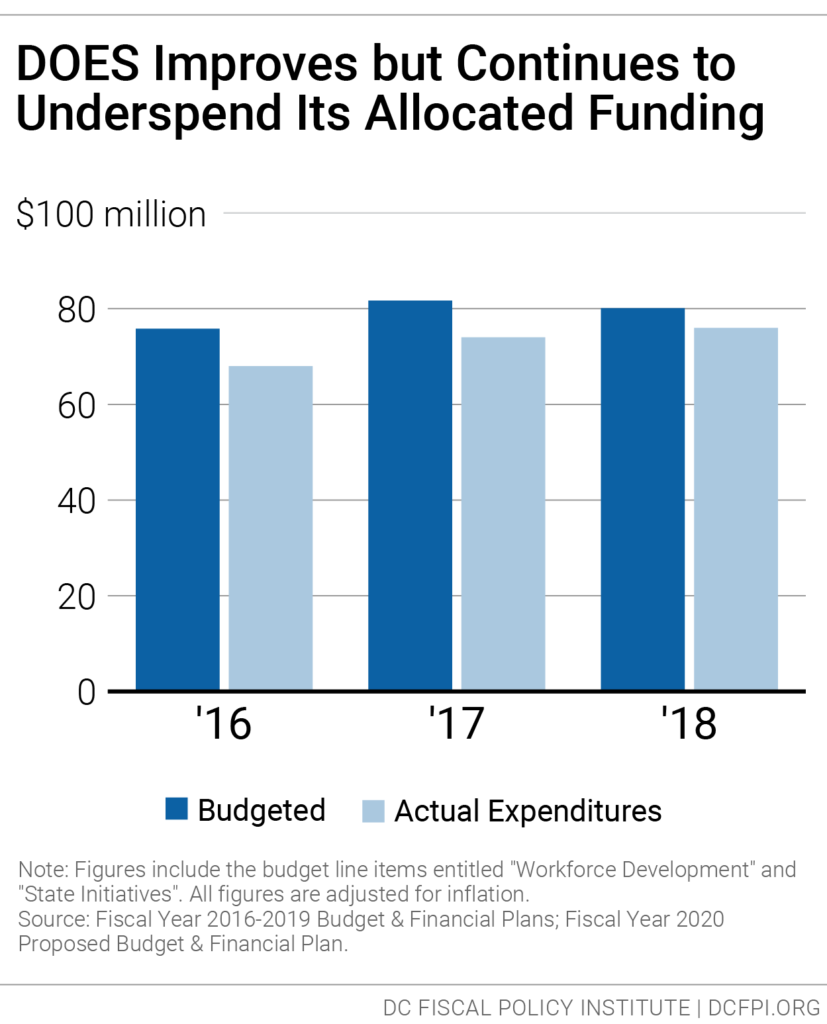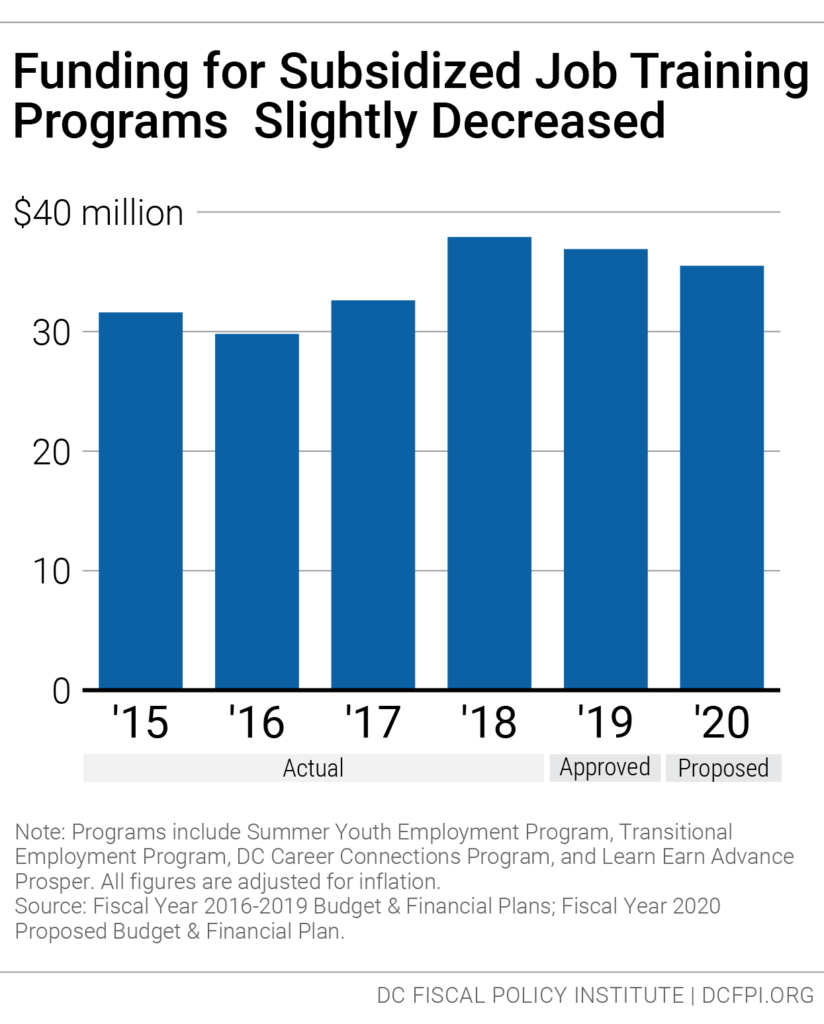Summary:
- The Department of Employment Services continues to under-spend its budget, but showing improvement in spending available funds
- $2.9 million for the DC Infrastructure Academy, a $1.1 million reduction from FY 2019
- $9.4 million to support start of the Paid Family and Medical Leave program in FY 2020
- $250,000 to continue the Aspire to Entrepreneurship training program for returning citizens
- $200,000 to continue Dream Grants, a micro-loan program for small business entrepreneurs in Wards 7 and 8
- $4 million in local funding for adult basic education and $650,000 for the Reengagement Center that provides employment and academic support for young adults who are neither employed nor in school
The Mayor’s proposed budget for fiscal year (FY) 2020 largely maintains support for DC’s key employment training and entrepreneurship programs. The budget also includes additional funds for the Paid Family Leave program that will start providing benefits in FY 2020. However, the proposed budget fails to fund the Career Pathways Innovation Fund, which is crucial for creating a strategic workforce development system that ensures that basic education and job training programs provide the appropriate skills and credentials to lead to successful careers.
Department of Employment Services Continues to Underspend but Shows Improvement
Over the past five years, the Department of Employment Services (DOES) has routinely spent less than its available funding, raising concerns about its ability to meet the needs of unemployed and underemployed residents. One of the largest gaps was in FY 2016 when the department spent $67 million on employment services compared with $75 million in available funding (Figure 1). In FY 2018, DOES spent $75 million on employment services and budgeted for $79 million, showing a marked improvement.[1]
Disparities in unemployment point to great needs for employment assistance; for example, the unemployment rates in Wards 7 and 8 are more than double[2] the average of the other six wards.

Slight Reductions in Subsidized Job Programs
The proposed budget continues to make investments in DC’s four main subsidized job training programs, but at slightly lower levels than last year (Figure 2). Overall, funding for the four programs would be $33.5 million, compared with $36 million in FY 2019.
The Mayor Marion S. Barry Summer Youth Employment Program (MBSYEP), which is locally funded, provides District youth with summer work experiences through subsidized placements in the private and government sectors. The budget proposes an increase of $305,000 in local funding to increase wages for 22 to 24-year- old participants to match DC’s minimum wage. The funds to support this increase came from savings in transportation assistance, since many participants are now eligible for the Kids Ride Free program. The budget doesn’t raise wages for the youngest MBSYEP participants, 14 to 15-year-olds, who currently earn just $5.25/hour, less than half of DC’s minimum wage. Additional funding for the program could support this wage increase and expand access to year-round opportunities.
The Transitional Employment Program (also called Project Empowerment) is a subsidized job program specifically targeted to returning citizens and others with high barriers to employment. The budget proposes $9.8 million in funding for FY 2020, compared with $10.5 million for FY 2019 (when adjusted for inflation).
The DC Career Connections Program (DC-CC) is a work readiness program started in FY 2017, specifically targeted to youth aged 20 to 24. The budget proposes $3.7 million for FY 2020, compared with the approved $4.4 million in FY 2019 (when adjusted for inflation).
Learn Earn Advance Prosper (LEAP) Academy was started in 2016 as a training and subsidized employment program for jobs in DC government and is specifically targeted to long-term TANF recipients. The proposed budget of $1.86 million is slightly lower than in FY 2019.

Funding Reduction for Infrastructure Academy
The proposed budget includes $2.9 million to support the operation of the District of Columbia Infrastructure Academy (DCIA), a job training program for underemployed and unemployed District residents focused on the infrastructure industry. This represents a $1.3 million reduction in local funds and $1.1 million reduction overall from FY 2019. To date, over 1,000 DC residents have applied to DCIA and 560 DC residents have enrolled. However, the local impact and sustainability of Infrastructure Academies is yet to be determined[3].
Although the operations funding was cut, the budget continues to allocate a total of $7.5 million through FY 2024 in the capital budget toward the renovation of the former Wilkinson Elementary School in Southeast DC where the Infrastructure Academy will be permanently housed. The Infrastructure Academy’s budget also includes unused private funds from Exelon as well as an additional $4 million from the Washington Gas/Alta merger (which is not yet reflected in the FY2020 Proposed Budget & Financial Plan). Additional DCIA partners include the University of the District of Columbia (UDC) and other private sector employers such as Washington Metropolitan Area Transit Authority (WMATA), DC Water and Ford Motor Company.
Proposed Budget Increases Funds to Support Start of Paid Family Leave
In December 2016, the DC Council passed the Universal Paid Leave Act (UPLA), which will provide up to eight weeks of parental leave to bond with a new child, six weeks of family leave to care for an ill family member with a serious health condition, and two weeks of medical leave to care for one’s own serious health condition. The program is not open to District government employees, who already receive paid family leave, or federal government employees. The program will start providing benefits in July 2020, part-way through FY 2020.
The approved budget for FY 2019 provided $5.1 million for implementation and $40 million in capital costs through 2023. The FY 2020 budget increases the operating budget amount from $5.1 million to $9.4 million, to address staffing needs and administration costs as the program starts operating. The program’s benefits and operations will eventually be self-funded through a payroll tax. Tax collection is scheduled to commence by July 1, 2019, to build up funds in anticipation of the start of benefits in July 2020.
Continued Support for Entrepreneurs
Within the Department of Small and Local Business Development (DSLBD), the proposed budget includes $250,000 in assistance to returning citizens through the Aspire to Entrepreneurship program, which provides returning citizens with training to assist in business pursuits. This program, first piloted in 2016, partners with Project Empowerment to provide program participants a stipend for the duration of the six-month training. DSLBD plans for 90 percent of FY 2020 program participants to be employed or self-employed by the end of the training. Businesses developed by past participants include child care centers, restaurants, trash hauling, landscaping services, event planning and mental health and wellness centers.
The budget also includes $200,000 to continue supporting Dream Grants — a micro loan program providing grants of up to $10,000 for small business entrepreneurs. This investment aims to specifically support small business entrepreneurs in Wards 7 and 8, some of whom can face difficulties[4] fairly competing to win lucrative city contracts. To date, DSLBD has awarded $250,000 to nearly 30 businesses. The focus on Wards 7 and 8 is further supplemented by an Office of East of the River (EOTR) Services, established by Mayor Bowser in January to address challenges faced by District residents from those wards. This office is housed in the Office of the City Administrator.
Transportation Subsidies to Adult Learners and Re-engaging Youth Maintained
For the third year in a row, the proposed budget maintains $1.98 million in transportation assistance to adults in publicly funded education programs. The subsidy provides $50 per month for Metrobus and Metrorail rides to program participants. This investment is crucial as transportation has repeatedly been identified as a major barrier to participation.[5] The proposed budget maintains this funding in FY 2020 through the District Department of Transportation (DDOT).
Continued Local Support for Adult Education, But Cut in Federal Funds
The Office of the State Superintendent of Education’s (OSSE) Post-Secondary and Career Education Division includes two programs – the Office of Adult & Family Education (AFE) and the Reengagement Center (REC) – that support adults in accessing education and career opportunities. AFE supports adult learners in increasing literacy levels, obtaining a GED, and accessing post-secondary school or job training. Local funding for AFE slightly increased ($4 million compared to last year’s $3.92 million), while federal funding decreased by over $700,000. The REC provides educational opportunities and support services for youth and younger adults ages 16 – 24. The proposed budget for the REC is $656,000, an increase of $34,000 from last year.
Zero Dollars (Again) for the Career Pathways Innovation Fund
The federal Workforce Innovation and Opportunity Act (WIOA) mandates that states align workforce programs to career pathways – coordinated, transparent education and training systems that adults can easily access for their specific training needs. To support adult education and workforce providers in meeting WIOA mandates, the DC Council created a $1.5 million Career Pathways Innovation Fund (CPIF) in FY 2016. But for the second year in a row, the Mayor’s proposed budget does not include any funding for CPIF.
Last year, the DC Council’s Committee on Labor and Workforce Development was able to later fully fund the CPIF with $1.5 million in one-time funds.
Decreased Funding for the Workforce Investment Council (WIC)
The Workforce Investment Council (WIC) is tasked with supporting workforce education, training, and support services to promote job readiness and employment. The Mayor’s proposed budget includes $1.5 million of local funding for the WIC. This is over $3.5 million less than last year for three reasons. First, last year’s approved budget included one-time funding at $1 million for DC Central Kitchen. Second, last year’s approved budget restored $1.5 million for the Career Pathways Innovation Fund (described above) after it was initially cut from the FY 2019 proposed budget. And finally, the FY 2020 proposed budget does not yet include federal WIOA funds that will be transferred from DOES, the WIOA fiscal agent, but the approved budget will almost certainly include these funds.
[1] All figures adjusted for inflation.
[2] DOES, 2017 Ward Labor Force, Employment, and Unemployment Rates, 2017
[3] Joseph W. Kane and Lara Fishbane, Can “Infrastructure Academies” Solve Our Most Pressing Workforce Challenges? Brookings, October 12, 2018.
[4] Morgan Baskin, A ‘Preference Points’ System Was Supposed to Help a Ward 8 Business Owner. It Didn’t. Washington City Paper, January 31, 2019.
[5] According to learner listening sessions conducted in 2015 by the DC Adult and Family Literacy Coalition (AFLC) and Fair Budget Coalition. In addition, over a third of 1,000 adult learners surveyed in 2016 by the Deputy Mayor for Education’s (DME) office reported their biggest transportation concern is its cost.



